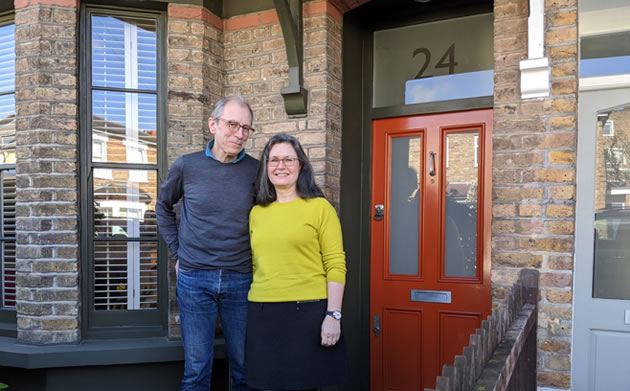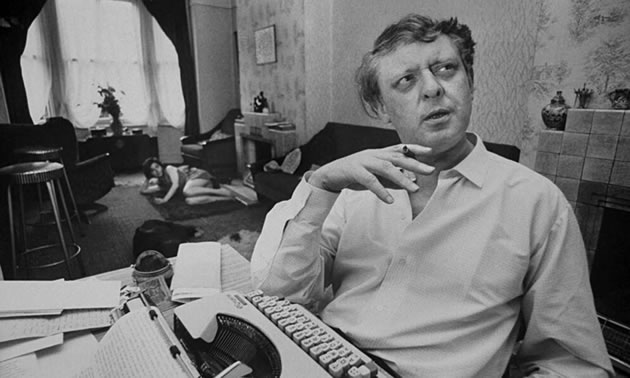New Campaign Launched To Get Blue Plaque For Former Home Of Anthony Burgess
The author of 'A Clockwork Orange', lived in Glebe Street in the 1960s

Photograph of current residents Richard and Tracey at former home of Anthony Burgess by James Willcocks
|
Academics, historians and local residents are backing a fresh bid to secure a blue plaque for the Chiswick house where the writer Anthony Burgess lived in the 1960s.
The Glebe Street home of the author – best known for his dystopian novel, A Clockwork Orange - was turned down for a plaque in 2015 but an English Heritage panel recommended that Burgess could be re-nominated after five years, instead of the usual ten. He is one of 21 distinguished novelists, poets and playwrights celebrated on the Chiswick Writers Trail, compiled by the Chiswick Book Festival.

Image of Anthony Burgess courtesy of anthonyburgess.org
The new bid has been submitted by Professor Andrew Biswell, Director of the International Anthony Burgess Foundation (IATF), and is supported by Burgess expert, and Chiswick resident, Professor Graham Holderness, Tracey Logan and her husband Richard Szwagrzak, who have lived in the house at 24 Glebe Street for 25 years, and Torin Douglas, the director of the Chiswick Book Festival.
Burgess moved with his first wife Lynne to Glebe Street in 1964, not long after A Clockwork Orange was published, and lived there for five years. He was reviewing television for The Listener, and needed to be in London to receive the new channel, BBC Two. He also published several of his most important novels while living in Chiswick, including Nothing Like the Sun, a fictional life of Shakespeare, written in Elizabethan English; Tremor of Intent, a spy thriller; and Enderby Outside, a sequel.
The Burgess Foundation archive contains his diary and accounts for 1964.
It states: “There are business expenses for events surrounding the publication of Burgess’s novel Nothing Like the Sun, which appeared on 23 April 1964, the four-hundredth anniversary of Shakespeare’s birth. Shortly before publication, Burgess notes that he was entertaining the press and some producers from Granada Television.”

Burgess writing in the Glebe Street house with wife Lynne lying on the rug
“We were thrilled to discover that Burgess had lived in our house soon after we moved in,” says Tracey Logan, an urban historian and former BBC Science reporter. “Neither of us is a literary scholar, but we both love Burgess's use of Russian slang in 'A Clockwork Orange', as Richard is Polish and I speak some Serbo-Croat.”
They are such keen Burgess fans that they painted their front door orange – in tribute to A Clockwork Orange – to mark his centenary year, 2017. .
Tracey says: “We have received enthusiastic letters and emails from many people asking if we had considered applying for a blue plaque. Some of Burgess's many fans have stopped us in the street and even made night-time Youtube videos outside the house. A French film crew came to make a documentary and Tim Mackintosh-Smith, a leading Arabic scholar, was thrilled to come in for tea after sharing his love of Burgess.”
Professor Holderness said: “Between 1963 and 1968, when he was living in Chiswick, Burgess revolutionised Shakespeare biography, bringing together fact and fiction as no-one else had ever done. He made a significant contribution to the historical novel, and wrote a musical version of Shakespeare’s life, never produced, that pre-dated the hugely successful and influential Shakespeare in Love.”
In his submission, Professor Biswell wrote: “The 2017 centenary of Burgess’s birth provided opportunities for revisiting his life and work. The BBC commissioned a series of radio programmes, including five radio Essays; a two-hour programme about his music; his translation of Oedipus the King (featuring Fiona Shaw and Christopher Eccleston); and a live broadcast of A Clockwork Orange with music.
“Audiences for Burgess’s literature and theatre have grown across the world. His books are newly available in countries where they were previously censored, with recent translations into Maltese, Chinese, Malay, Turkish, Russian and Romanian. His stage plays are frequently performed in Britain, USA, Germany, Mexico, Hungary, Russia, Malta and Singapore.”
Douglas said: “We think the Foundation has made an excellent case for English Heritage to approve a blue plaque for Burgess in Glebe Street. Chiswick has relatively few plaques, given the number of great writers who have lived here.” There is a page devoted to Burgess’s time in Chiswick, including a blog by Professor Holderness, on the Chiswick Timeline of Writers and Books, which lists over 400 authors who have lived in Chiswick. /
The Arabic scholar Tim Mackintosh-Smith, who visited Glebe Street, said: “I really do think the house should have that blue plaque. I am sure Burgess will be remembered in the long term as a major figure in twentieth-century literature, European as well as British.”
This year’s Chiswick Book Festival l will take place from September 10th to 14th, 2020.
Like Reading Articles Like This? Help Us Produce More This site remains committed to providing local community news and public interest journalism. Articles such as the one above are integral to what we do. We aim to feature as much as possible on local societies, charities based in the area, fundraising efforts by residents, community-based initiatives and even helping people find missing pets. We’ve always done that and won’t be changing, in fact we’d like to do more. However, the readership that these stories generates is often below that needed to cover the cost of producing them. Our financial resources are limited and the local media environment is intensely competitive so there is a constraint on what we can do. We are therefore asking our readers to consider offering financial support to these efforts. Any money given will help support community and public interest news and the expansion of our coverage in this area. A suggested monthly payment is £8 but we would be grateful for any amount for instance if you think this site offers the equivalent value of a subscription to a daily printed newspaper you may wish to consider £20 per month. If neither of these amounts is suitable for you then contact info@neighbournet.com and we can set up an alternative. All payments are made through a secure web site. One-off donations are also appreciated. Choose The Amount You Wish To Contribute. If you do support us in this way we’d be interested to hear what kind of articles you would like to see more of on the site – send your suggestions to the editor. For businesses we offer the chance to be a corporate sponsor of community content on the site. For £30 plus VAT per month you will be the designated sponsor of at least one article a month with your logo appearing if supplied. If there is a specific community group or initiative you’d like to support we can make sure your sponsorship is featured on related content for a one off payment of £50 plus VAT. All payments are made through a secure web site. |
March 10, 2020